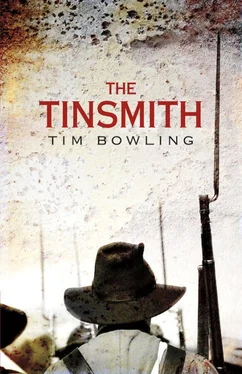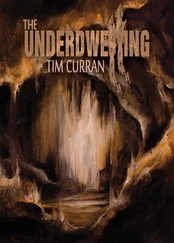The Chinese placed the long nail of his forefinger to his wispy-haired chin. “Who are you? Do you know him?”
“I’m an old friend. From the United States.”
“The United States?” The Chinaman grinned, revealing a front tooth that hung like a tiny ice pick and several gold-capped molars that seemed roughly jammed into place. “Maybe you a buyer, huh?”
“No. Listen, is he here or not?”
The Chinaman lowered the gun horizontally, to his waist.
“Gone to New Westminster. Back maybe one week.”
“A week? Why so long?”
The Chinese grinned even more broadly than before. “Business. Fish almost come. Much work to do.”
Anson wondered why this one man had not been forced away at gunpoint like the others, but he wasn’t given the encouragement to ask. Almost as suddenly as he’d arrived, the Chinaman disappeared, fading away like smoke. The doctor had little choice but to return to the wharf and inform Henry Lansdowne of Dare’s absence.
“You’ll be wanting to stay on with us, then?” the Englishman said, his voice neither warm nor cold.
Anson turned and took a final look toward Dare’s settlement. There still weren’t any gulls keening above the cannery. The absence of the rhythmic sound of tin being cut suddenly struck him like the absence of the pulse in a body. The silence was gloomy, and not even the sunshine brought any warmth to the place.
“Yes,” he said. “For a short time. But I intend to pay for my room and board.”
The Englishman scowled. “If you prefer.”
Anson sighed. What he would have preferred was to go upriver to New Westminster and find a hotel, but, somehow, he felt the need to stay closer to Crescent Slough. If the place itself wasn’t so unwelcoming, he might have made himself at home in the tent. But he well knew what sleeping rough would do to his aching body.
Slowly he lowered himself into the skiff, almost ashamed by how relieved he was to return to Chilukthan. And yet, the silence made him even more anxious to see Dare and talk with him. There was something unnervingly final about it that needed to be halted before the silence spread all along the river and spilled over into Anson’s own crowded memories; he did not want the past blanked out this way, no matter how much it might haunt him. For the past, after all, was nothing less than a proof of life. Without its tug, how was a man to know his blood still flowed through his body?
Henry Lansdowne unmoored the skiff and settled behind the oars. Somehow his silence was of a different kind, and Anson had no desire to break it. Instead, the doctor sat in the stern and watched the black emptiness of Crescent Slough shrink to the size of a cave mouth, to the size of a horse’s eye, to nothing.
Three days passed, leavened only by Anson’s keen interest in Chilukthan’s preparations for the next salmon run. Rarely had he seen such a combination of skill and speed as evinced by the Indian women on the main wharf who wove the linen fishnets. But the Chinese crew who soldered the cans in back of one of the smaller buildings especially fascinated him, mostly because their hot, repetitive work with molten solder and tinplate and muriatic acid was exactly what Dare must have been doing for years. Watching the Chinese through the crinkled air of extreme temperatures as they doused pig lead in large, fire-enveloped crucibles of brick, it was in fact easy to see Dare through the smoke and steam, sweating as he carefully applied his soldering iron along the seams of each tin. Along with the heat and the dull rhythm of the pressman stepping on the treadle that activated the cutting of the tinplate sheets into appropriate sizes, the cloying smells of the chemicals quickly disoriented Anson’s senses. But he could not easily pull himself away. There was something mesmeric in the rapid movements of the Chinese as they waved their brushes of acid in calligraphy strokes and fed sheets of tin into machines, all the while grinning as if delighted to be doing any kind of work that kept them away from the river. The explosive clash of red flame against silver, the endless billows of grey smoke and dripping steam, the blurred faces appearing and disappearing in the heat-curdled air held Anson in a thrall he could break only when he felt himself on the verge of passing out.
Despite the fascinating diversions of the fishing preparations, however, and many hours spent in his room reading his well-worn editions of Virgil and Tibullus, Anson grew increasingly restless. For the first time since Antietam, Dare had summoned him for help, and in this instance it was with words, clear and direct, not with an escaped slave’s red-eyed look of terror. The significance was not lost on Anson: because Dare had cabled, Dare’s life must be threatened. And if his life was threatened, and Anson could not help, then more than their shared past was in peril; his nobler sentiments, his love for his country and for Elizabeth, would be committed at last to the same cold grave. Each moment that passed in which he did not begin to act on Dare’s summons in some practical way gnawed at Anson’s nerves, at his sense of himself as a man who could be relied upon.
He tried to hire an Indian to row him the two miles upriver to New Westminster, but they were all too occupied with their cannery work to oblige him. And in any case, Anson wasn’t even sure that Dare had remained in that city. According to Henry Lansdowne, Dare most likely took a ship along the opposite bank from New Westminster to Victoria, because that was where a cannery crew could be hired. When Anson mentioned that he ought to do the same, the Englishman looked at him soberly.
“If he’s gone to Victoria, he’ll soon be back. The salmon are on their way, doctor. With respect, you are a stranger here and do not recognize the urgency. The salmon are a curious harvest, most unpredictable. They are not like the apples in the trees or even the potatoes in the ground. They live far out at sea for years before they are called back to the very waters inland in which they came to be. Theirs is a blessed and miraculous travail. It is much harder to be sure of their bounty.”
“Then how is it that you know they are coming in such numbers?”
The two men had stood on the dike above the cannery at Chilukthan, looking north over the river. Henry Lansdowne rubbed a bony hand along the white side whiskers of one cheek. His voice, though low and somber, suddenly trembled with a distinct quality of awe.
“You ask how I know that the salmon are coming in such numbers? Doctor, I know as only a devout man knows his God. They are coming. Theirs is a cycle designed by the Lord, and He has made it Truth that in every fourth year, the salmon return in abundance. Even the Indians, savage though they are, understand this. And Mr. Dare…”
Anson’s blood quickened. He waited for the insult, prepared to refute it, but it did not come.
“… appears to understand the salmon’s habits better than most. He’ll be back before they are here.”
Reluctantly, Anson accepted his host’s logic. The wisest course, as so often proved to be the case, was the hardest course. And if it was so hard to wait, Anson consoled himself finally that waiting was the right thing to do.
And so, in the days that followed, he tramped the soft peat bogs, scaring up flocks of red-winged blackbirds, their scarlet bangles shaking like rose petals in the wind. Once, he had met Thomas Lansdowne’s daughter, Louisa, along the way. She was a pretty girl of ten years, with long black hair and a winning, dimpled smile. The day had been blustery, and her hair had blown out behind her in a rippled stream. Anson had been gripped by a sudden, not unpleasant sensation that he had encountered the childhood ghost of his late, beloved wife, except that this girl, Louisa, while she possessed Elizabeth’s same delicate cheekbones and rosy complexion, was more animated; it seemed, in fact, that her vital nature was straining against the very proprieties and gloom of the settlement. He had exchanged only the briefest of pleasantries with the child before she had skipped off over the peat, her small hand holding the straw bonnet to her head to prevent its flying off on the breeze.
Читать дальше












